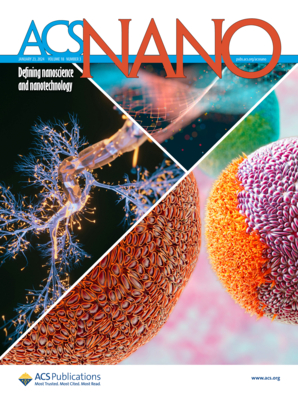Combretastatin A4-Based Albumin Nanoparticles Remodeling the Tumor Immune Microenvironment to Enhance T Cell Immunotherapy in Colon Cancer.
IF 15.8
1区 材料科学
Q1 CHEMISTRY, MULTIDISCIPLINARY
引用次数: 0
Abstract
The immunosuppressive tumor microenvironment formed by many solid tumors, particularly colon cancer, suppresses innate immune molecule expression and consequently limits T cell infiltration. Microtubule inhibitors were originally developed to eliminate tumors by inducing mitotic arrest. However, recent studies have shown that these inhibitors can also disrupt the microtubule dynamics and enhance the efficacy of immunotherapies. These findings highlight the target microtubule as a promising strategy for immune modulation. In this study, we investigated the use of Combretastatin A4 (CA4), a hydrophobic microtubule inhibitor that targets tumor vascular endothelial cells. To improve its solubility and delivery efficiency, CA4 was encapsulated in human serum albumin to form CA4@Alb. This formulation effectively inhibited microtubules in tumor endothelial cells, resulting in the promoted infiltration of erythrocytes into the tumor microenvironment. These erythrocytes were subsequently phagocytosed by intratumoral macrophages, leading to their pro-inflammatory activation. Notably, erythrophagocytic macrophages upregulated innate immune molecules, including chemokine CXCL10 and costimulatory molecule CD86, and enhanced T cell infiltration and activation. As a result, CA4@Alb significantly improved the responsiveness to T cell-based immunotherapies. Overall, our findings indicate that CA4@Alb effectively reprograms the immunosuppressive microenvironment of colon cancer and holds promising translational potential for enhancing immunotherapy efficacy.基于Combretastatin a4的白蛋白纳米颗粒重塑肿瘤免疫微环境以增强结肠癌的T细胞免疫治疗。
许多实体肿瘤,特别是结肠癌形成的免疫抑制肿瘤微环境,抑制先天免疫分子的表达,从而限制T细胞的浸润。微管抑制剂最初是为了通过诱导有丝分裂停止来消除肿瘤而开发的。然而,最近的研究表明,这些抑制剂也可以破坏微管动力学,提高免疫治疗的疗效。这些发现突出了靶微管作为一种很有前途的免疫调节策略。在这项研究中,我们研究了Combretastatin A4 (CA4)的使用,这是一种针对肿瘤血管内皮细胞的疏水微管抑制剂。为了提高其溶解度和递送效率,将CA4包封在人血清白蛋白中形成CA4@Alb。该制剂有效抑制肿瘤内皮细胞中的微管,促进红细胞向肿瘤微环境的浸润。这些红细胞随后被肿瘤内巨噬细胞吞噬,导致它们的促炎激活。值得注意的是,红细胞巨噬细胞上调固有免疫分子,包括趋化因子CXCL10和共刺激分子CD86,增强T细胞的浸润和活化。结果,CA4@Alb显著提高了对T细胞免疫疗法的反应性。总之,我们的研究结果表明CA4@Alb有效地重编程了结肠癌的免疫抑制微环境,并具有增强免疫治疗效果的良好转化潜力。
本文章由计算机程序翻译,如有差异,请以英文原文为准。
求助全文
约1分钟内获得全文
求助全文
来源期刊

ACS Nano
工程技术-材料科学:综合
CiteScore
26.00
自引率
4.10%
发文量
1627
审稿时长
1.7 months
期刊介绍:
ACS Nano, published monthly, serves as an international forum for comprehensive articles on nanoscience and nanotechnology research at the intersections of chemistry, biology, materials science, physics, and engineering. The journal fosters communication among scientists in these communities, facilitating collaboration, new research opportunities, and advancements through discoveries. ACS Nano covers synthesis, assembly, characterization, theory, and simulation of nanostructures, nanobiotechnology, nanofabrication, methods and tools for nanoscience and nanotechnology, and self- and directed-assembly. Alongside original research articles, it offers thorough reviews, perspectives on cutting-edge research, and discussions envisioning the future of nanoscience and nanotechnology.
 求助内容:
求助内容: 应助结果提醒方式:
应助结果提醒方式:


